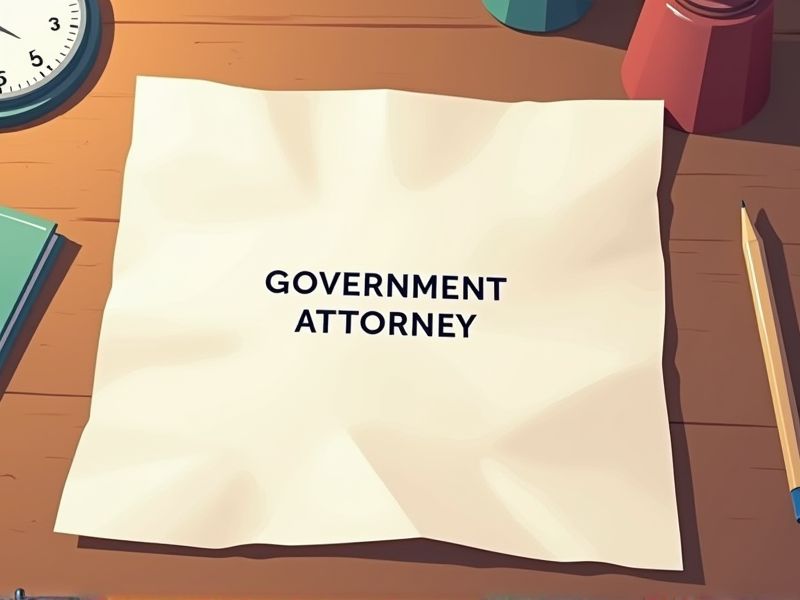
Government Attorneys face complex legal challenges that require specialized knowledge and skills. Certifications such as those in administrative law or public policy demonstrate proficiency in areas critical to government work. These credentials can lead to more impactful service and career advancement opportunities. Here are some certifications you may need as a Government Attorney.
State Bar Admission Certificate
Holding a State Bar Admission Certificate ensures that a government attorney has met the standardized qualifications and ethical standards required to practice law. This certification provides a measure of competence and professionalism, critical for individuals responsible for upholding and implementing the law. Without it, the attorney cannot legally represent the government in legal matters, diminishing the legal proceedings' credibility and validity. The certificate also provides a mechanism for accountability, as oversight from the state's bar requires attorneys to adhere to specified ethical guidelines.
Certified Government Contracts Attorney (CGCA)
A Certified Government Contracts Attorney (CGCA) possesses specialized knowledge in navigating the complexities of government contracts, thereby ensuring legal compliance and reducing the risk of costly errors. Contract disputes can lead to significant financial loss or legal repercussions; a CGCA minimizes these risks through expert negotiation and contract management. Constant changes in government policies and regulations require a CGCA's expertise to maintain up-to-date legal strategies. Procurement processes are often complex and regulatory-driven, and a CGCA provides the necessary legal framework to support successful contract executions.
Certificate in Public Sector Law
Increased understanding of public sector law equips government attorneys with specialized knowledge crucial for navigating complex legal frameworks inherent in government operations. This certification provides attorneys with insights into regulatory compliance, reducing the risk of legal missteps in policy implementation. A solid grasp of public sector law enhances an attorney's ability to draft and interpret legislation that impacts public administration. Certification demonstrates a commitment to professional development, fostering trust and credibility with governmental agencies and the public.
Certification in Ethics and Professional Responsibility
A Certification in Ethics and Professional Responsibility ensures government attorneys adhere to legal standards and maintain public trust. Missteps in ethics can lead to legal disputes or scandals that undermine governmental integrity. Training in ethics prepares attorneys to navigate complex moral dilemmas inherent in government work. This certification enhances the credibility and accountability of government legal practices, promoting consistent ethical conduct.
Certificate in Administrative and Regulatory Law
A Certificate in Administrative and Regulatory Law equips government attorneys with an understanding of how to navigate complex regulatory frameworks. This knowledge enables them to effectively draft and implement policies in line with governmental standards. Attorneys with this certification are better prepared to advocate within regulatory agencies and courts. The certification enhances professional credibility, contributing to informed decision-making and strategic legal counsel.
Certification in Criminal Law Practice
Certification in Criminal Law Practice enhances a government attorney's expertise, directly impacting their ability to handle complex cases effectively. Specialized training and knowledge reduce errors and improve case outcomes, which is crucial in legal contexts. Competence in criminal law ensures adherence to justice standards, maintaining integrity in government legal actions. Certification fosters continuous professional development, keeping attorneys updated with evolving legal trends and policies.
Certified Information Privacy Professional (CIPP)
Government attorneys handle a vast amount of sensitive and personal data, necessitating an understanding of privacy laws and regulations, which the CIPP certification provides. This certification ensures that attorneys are well-versed in data protection principles, reducing the risk of legal breaches and non-compliance. As privacy laws become increasingly complex and globally interconnected, having a CIPP-certified professional improves a government's ability to navigate and implement these laws effectively. In situations involving international data transfers or cross-border investigations, a CIPP certification equips government attorneys with the necessary expertise to manage privacy concerns adeptly.
Certificate in Environmental Law
A Certificate in Environmental Law equips government attorneys with specialized knowledge to navigate complex regulations effectively. Enhanced understanding of environmental statutes aids in enforcing compliance, which safeguards public health and ecosystems. Expertise in this field enables attorneys to draft more robust and defensible environmental policies. Proficiency in environmental law can contribute to more informed advocacy and litigation strategies when addressing climate change and sustainability issues.
Certification in Dispute Resolution and Negotiation
Government attorneys often handle complex legal cases that require specialized skills in dispute resolution and negotiation, improving case outcomes. Acquiring certification sharpens these skills, allowing attorneys to effectively manage conflicts and facilitate agreements between parties. Better dispute resolution and negotiation techniques can lead to time and cost savings for public resources. The credibility and expertise gained through certification can enhance the attorney's professional growth and advance public trust in governmental legal processes.
Certified Legal Manager (CLM)
Government attorneys often handle complex and high-stakes legal matters, necessitating robust administrative and leadership skills; a Certified Legal Manager (CLM) provides the training required for managing such complexities. Enhanced organizational skills through CLM certification help streamline operations in government legal departments, leading to improved efficiency. A CLM fosters best practices and adheres to ethical standards, crucial for maintaining public trust in government legal processes. Having a CLM credential equips government attorneys to better manage resources and personnel, resulting in more effective legal service delivery.
Summary
When a government attorney obtains additional certifications, you can expect an enhancement in their expertise and credibility. This may lead to improved legal strategies and more effective advocacy in cases they manage. Their specialized knowledge might make them more efficient in handling complex legal issues. Consequently, the overall legal outcomes for the government could improve, benefiting the public they serve.
